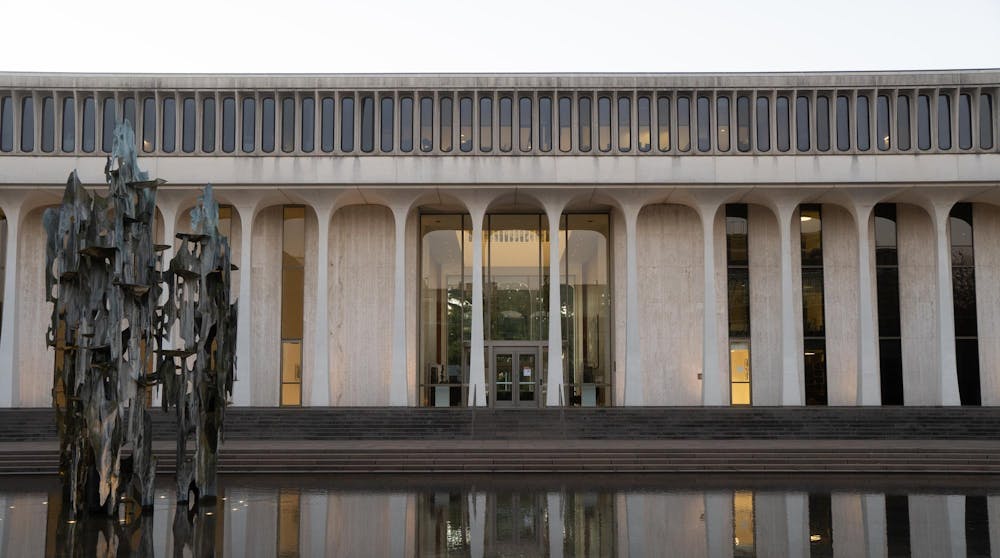If the 2024 election was a rebuke of American institutions, it was an even stronger rebuke of the educational elite. The Democratic Party, long the party of American labor, has become the party of the college educated. As college students preparing to be the leaders of tomorrow, that sounds like a good thing. This institution supposedly selects the brightest students in the nation. It is supposed to mold our minds for leadership in the world.
And yet, Ivy League graduates have lost the trust and confidence of the people of this country. As New York Times Opinion columnist David Brooks sees it, the Democratic Party has become “the party of the universities, the affluent suburbs and the hipster urban cores.” That party lost to Donald Trump, who was able to build “a multiracial, working-class majority,” the very thing Democrats prided themselves on having.
The great irony of this populist discontent is that it is actually led by Ivy League graduates. JD Vance, a graduate of Yale Law School, continuously vilifies “the regime” by attacking institutions he sees as liberal, including “the news media, Hollywood, big business and higher education.” Senator Josh Hawley, a graduate of Stanford and Yale, raised his fist in support of the Jan. 6 riots. And from Princeton, now-Defense Secretary nominee Pete Hegseth ’03 came to the defense of Jan. 6 insurrectionists the day after the attack, saying that “they love freedom and they love free markets.”
It seems our leaders have forgotten how to lead a pluralistic and economically diverse society. To renew confidence in tomorrow’s leaders, the solution at Princeton must be a return to common values. One way to do this is a new civic education requirement.
Princeton would not be the first university in the country to adopt such a requirement. Stanford’s Civic, Liberal and Global Education (COLLEGE) requirement, for example, includes a Citizenship in the 21st Century course, which allows students to tackle pressing issues such as “the intersection of citizenship with race, social class, and economic inequality; the threat of authoritarianism; and civil disobedience” in a safe, guided classroom environment. Purdue requires civic literacy for graduation, which can be accomplished through approved courses, civic literacy events, or podcasts, in addition to a required test.
To some, such a requirement at Princeton may seem like yet another box that needs to be checked off in order to obtain a degree. But civic education at Princeton brings a unique opportunity to the table. It allows the University to carry out one of the foundational purposes of liberal education — to create citizens. Horace Mann, often called “the father of American education,” wrote that “it may be an easy thing to make a Republic; but it is a very laborious thing to make Republicans.”
The dissonance between the educated elite, the anti-elites, and populist forces is in many ways a result of the failure of universities to make “Republicans” — citizens committed to defending our Republic. A worrying number of young Americans are no longer committed to democracy. In fact, 31 percent of 18–29 year olds believe that America should “explore alternatives to democracy.” In the face of a growing tide of anti-democracy sentiment in America, it is incumbent on Princeton to resist the tide of American illiberalism by equipping its students with the tools to defend shared democratic values.
To do so, Princeton should implement a required first-year civic learning seminar in the same vein as Stanford’s COLLEGE or Columbia’s Contemporary Civilization courses. Expanding access to civic education to the entire undergraduate class, not just those naturally inclined towards politics, will not only provide a 21st century introduction to American political values in practice, but it will also help Princeton tackle a perennial problem — a brain drain into finance and consulting.

This is because civic education is not just about learning how the American government works. Inherent in civics is community. The civically-minded understand the need to engage fully with the community, whether that be through volunteerism, advocacy, or engagement in the political process. That’s why the Pace Center for Civic Engagement provides access to service and civic engagement opportunities “so that students can respond to the needs of the world in responsible ways.”
One might say that Princeton already offers courses dedicated toward preparing students for civic life: the Program in Community-Engaged Scholarship (ProCES). These courses “bring community-identified priorities and interests into conversation with academic learning goals through experiential learning,” including projects such as working on asylum claims or affordable housing research.
Though these projects get students involved in the community, they do not go far enough. What a civic education program at Princeton must include, that ProCES currently does not, is a rigorous survey of how democracy should work and how we can engage with the political community. It should force students to grapple with questions of political philosophy, such as equality, justice, and the role of government. In the classroom environment, these questions invite disagreement, and grappling with that disagreement forces us to learn how to debate civilly in an informed environment. This is civic learning, a component of civic education distinct from civic service. In effect, learning and grappling with the theory behind American political tradition.
If Princetonians commit themselves to effective civic learning, it will undoubtedly require them to think critically and deeply about their place in the political community and whether they live their lives “in the nation’s service and the service of humanity.” And it will undoubtedly push more students to engage more thoughtfully and regularly with public service initiatives. At a university committed to be in “the nation’s service,” it seems like a no-brainer to follow our peers and institute an accessible, comprehensive, and engaging civic learning program.

Kenneth Chan is a first-year Opinion writer from East Brunswick, N.J. planning to major in Operations Research and Financial Engineering. He can be reached at kchan2[at]princeton.edu.








